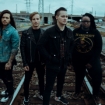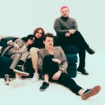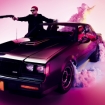There are so many bands out there doing so many interesting things, it's hard to know where to turn. That's why we've created Crash Course, a recurring feature offering a concise introduction to a band or artist that we think slays, covering their origins, process and vision. Our latest subject is Giver, a German hardcore quintet that evokes such genre-leaders as Converge, Blacklisted and Oathbreaker on their fantastic second album, Sculpture of Violence, which they are premiering today, February 5th, with Revolver. Listen to it below.
Due out Friday, February 7th, via Holy Roar Records (you can order it here), Sculpture of Violence is centered around the question of "whether there can be peace," which the band addresses across 10 tracks that cover topics such as gender identity, climate change and consumerism.
Here, in addition to debuting the album, bassist-vocalist Chris Schmidt and guitarist Julian Schulze explain what exactly Giver stand for and share stories from the road — such as the disastrous show that left Schulze with burned and bloodied feet.
WHO IS GIVER? CAN YOU GIVE US A BRIEF HISTORY ON HOW YOU CAME TOGETHER?
JULIAN SCHULZE Most of us are from a small town called Paderborn in the middle of Germany where we started this project back in 2013. When we began to jam, we had nothing in mind but writing a couple of hardcore-punk songs, hanging out together and playing shows in front of our friends. After self-recording our first EP in our basements and rooms, most of us moved to Cologne to study, where we met Benni [Ricken, guitarist] and Rob [Anderson, vocalist], [then] eventually went to Dresden. Since then, this band started growing into a more and more serious and ambitious project taking up more space in our lives. We released another EP and our first album, Where the Cycle Breaks, on Powertrip Records and Holy Roar, started touring a lot and kept on pouring our free hours into the band. We've shared countless great moments along the way and definitely had an impact on each others lives, but we also had our ups and downs as a group, which we always somehow managed to overcome and talk out in order to come together again and again.
IF YOU HAD TO DESCRIBE YOUR BAND'S MISSION STATEMENT, WHAT WOULD IT BE?
SCHULZE That's not an easy question to answer. On a personal level, we are being a band not only to play music together, but to have a platform to engage with different aspects of our lives as a group of mostly like-minded people. Whether it is agreeing on topic that matter to each of us, discussing and reflecting on things that happen in the world around us, sharing personal problems and issues with each other, conveying these things into a lyric or an opinion or just being exposed new places, people and ideas day to day. We always take away experiences and new perceptions from this band and then bring new ones back in from the outside world and our everyday lives.
CHRIS SCHMIDT As a political "message" or "mission statement," we try to address topics like the climate crisis, the exploitative system we live in, the far right growing stronger and masculinity in our scene because these things matter to us personally. We'd love to encourage people to team up with others and be political together on whatever subject they find meaningful. Change starts with yourself and the people close to you. The times are getting harder and we need people to be anti-capitalist, feminist and anti-fascist in the decades to come more than ever. Nationalism is on the rise and the climate catastrophe will exacerbate all present inequalities we already face. We feel like, being unpolitical is just not possible anymore. What people mostly mean when they claim to be that, it just means they accept the system we live in and act in compliance with it and that is political, too. Hardcore and punk are countercultures and can be a great place to raise these questions and find answers to them.
HOW DID YOU GET INTO HARDCORE AND METAL?
SCHULZE Most of us grew up being exposed to a musical environment from an early age, but punk and metal never played a role there. [Laughs] I'm sure all of us got into it eventually through friends and local shows in our hometown. The energy that this genre holds is just too captivating. For the small size of a city that our hometown still is, there used to be a pretty vivid scene with a lot of great things and shows going on. Sadly, that changed a bit in the last years and not many new bands are coming up anymore, but we still try to play there at least once a year to keep the ball rolling.
BEING IN A BAND, WHAT'S THE HARDEST CHALLENGE YOU HAVE COME ACROSS SO FAR, AND HOW DID YOU OVERCOME IT?
SCHMIDT The hardest challenge was probably touring for several weeks without getting pissed off by each other. [Laughs] It may sound mundane, but giving each other space, accepting the tiny things that bug you about your bandmates and approaching them for those you just can't stand after a while cramped in the van together on far too little sleep can be super hard. Touring is a much romanticized way of living, but sharing the same square meter with the same five people for weeks on end can become really stressful. So at the end of our longest tour so far, we had a massive argument but managed to get ourselves to sit around a table a week or two later and talked it out for hours. The funny thing is that now we are all really happy that this happened because we learned so much from that incident. We are more open to each other and don't hold our criticism back as much because the sooner you address a matter, the easier it is to find a compromise.
WHAT'S THE CRAZIEST THING THAT'S EVER HAPPENED AT ONE OF YOUR SHOWS?
SCHMIDT We played an insanely horrible set on the open stage at Fluff Fest a couple of years ago. Playing there was a huge thing for us and we were all really nervous, but then everything that could possibly go wrong did go wrong. The plan was to share a slot and instruments with our drummer's other band, Jail. But the schedule got mixed up and we ended up only having time to play three songs. In these few minutes, half of the equipment fell part, all guitars were out of tune and I think a bass string broke. But the worst was that Julian burnt his feet while playing barefoot on this super-hot open-air stage. Suddenly, there was blood all around him and he couldn't put his shoes back on because we didn't have time and his feet were hurting too much. Rob didn't know what to say, and just shouted, "FLUFF FEST, HOW ARE YOU?!" with not a single person responding. When we got offstage, we looked at each other and were like, "What the hell was that?!" However, they actually booked us on the main stage two years later with our first LP out and we tried hard not to fuck up again. [Laughs]
WHAT'S THE BEST PART OF BEING ON TOUR AND WHAT'S THE WORST PART OF BEING ON TOUR?
SCHULZE To me, the best part is playing the music you wrote with some of your best friends live in different, interesting places every night. That is and always will be the main reason why we are a band. Sounds corny, but it's true. The worst is to not get enough sleep night after night.
WHAT'S THE WEIRDEST PLACE YOU EVER SLEPT ON TOUR?
SCHMIDT Hmm, that's a hard one given the fact that sleeping on dirty floors is the usual case anyway. But a night that stands out in my memory is one we spent in a cold and moldy rehearsal room in this huge, old bunker. I think we slept in a tiny little room with 13 people, no light or window. And there was a Turkish folklore band next door jamming till 5 a.m. in the morning and none of us really got a wink of sleep. We begged them to stop playing or at least be a bit quieter several times, but they were more punk than us.
WHAT'S YOUR ESSENTIAL ITEMS THAT YOU HAVE TO BRING WITH YOU WHILE ON TOUR?
SCHULZE Well, that depends. Apart from the usual stuff — sleeping bag and mat, clothes, toothbrush — I actually need my mp3 player, my smartphone and some good books. Some of the others also take Gameboys, fanzines or newspapers with them. Touring means endless hours of hanging around. Ahh, and snacks. Loads of snacks.
WHAT DO YOU GUYS DO OUTSIDE OF THE BAND?
SCHMIDT Some of us actually spend a lot of time setting up shows here in Cologne with a group of friends. Besides that, we live very different lives and realities. One of us just became a father and spends his free time taking care of his child and his dog, others are active in different political contexts and groups that are working in the climate justice movement or helping to keep the few non-commercial emancipatory places in Cologne alive.
WHAT BAND OR MUSICAL ARTIST ARE YOU A BIGGEST FAN OF? PROVE YOUR FANDOM!
SCHULZE It's really not easy to agree on an artist or a band we all really love. [Laughs]. However, I would say that some of the following strike a chord in each of us: Petrol Girls, Russian Circles, Oathbreaker, Idles, Wayste, Converge, Nirvana, AYS.
Seeing Petrol Girls live for the first time was an intense experience for all of us because of the urgency with which Ren performs her very personal and angry songs. However, when it comes to merch and number of shows we've seen, I think it's definitely our friends in Tides Denied who would win the race. If you are into straightforward youth-crew hardcore, you should check them out.
IF YOU COULD ONLY PLAY ONE OF YOUR SONGS FOR SOMEONE TO INTRODUCE THEM TO YOUR BAND, WHAT SONG WOULD IT BE AND WHY?
SCHMIDT I guess, right now, we might play the title track of our upcoming LP "Sculpture of Violence" because sound-wise it's kind of iconic for the shift in sound and songwriting that we went through on this new record and, lyrically, it can be seen as the centerpiece of the album. It is a tune that deals with the categories we are brought up in and how hard it is to overcome them and be truly free. Whether it is nationality, gender or sexual orientation — we're all constructed and should be able to be whoever we want to be as long as we don't harm others. It's important to realize that these patterns are not naturally given and that we can overcome them. Everything could always be different. What gives hope is to produce hope actively.












